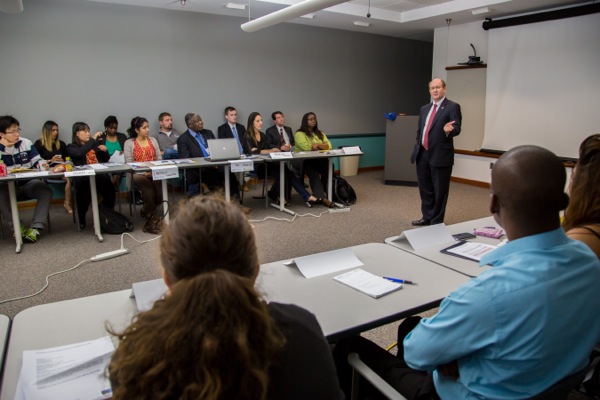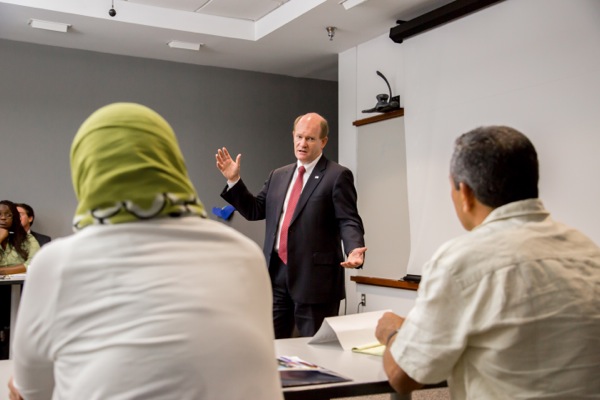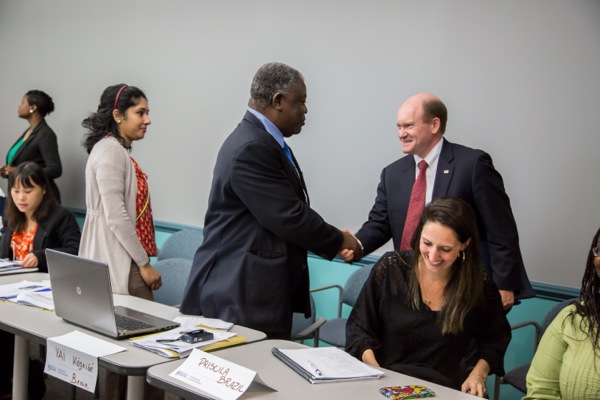


Avian influenza
Emergency Poultry Disease Response workshop considers biosecurity, rapid response
11:05 a.m., July 30, 2015--Educating the national and international poultry community about how to best respond to disease outbreaks is of the upmost importance to the University of Delaware, and in a year when avian influenza has spread throughout the world, that mission takes on an extra level of importance.
It was with that in mind that 19 participants from 18 countries took part in UD’s Emergency Poultry Disease Response (EPDR) certificate program, held at the College of Agriculture and Natural Resources in June.
Global Stories
Fulbright awards
Peace Corps plans
The program was sponsored by the U.S. Department of Agriculture Animal and Plant Health Inspection Service (USDA-APHIS) in conjunction with UD’s Division of Professional and Continuing Studies and is part of a combination of science-based training programs provided by UD’s College of Agriculture and Natural Resources (CANR) and the Avian Biosciences Center (ABC) to help Delaware’s national and international emergency disease response capability.
The program was led by Eric Benson, professor in the Department of Animal and Food Sciences (ANFS); Jack Gelb, professor in ANFS and director of the ABC; Robert Alphin, instructor in ANFS and manager of the University’s Allen Laboratory; George Irvine, assistant director of organizational learning solutions in Professional and Continuing Studies; and Dan Hougentogler, senior research associate in ANFS.
The participants spent five days learning about the avian influenza virus, disease surveillance and outbreak response and control, among other topics.
The training program also presented and utilized the “Delaware model,” which emphasizes close cooperation among government, industry and educational institutions to manage avian influenza outbreaks with best management practices and technologies related to controlling outbreaks of avian influenza and other diseases.
The participants were able to listen to experts from across the country lecture on specific topics — such as the current status of avian influenza in wild birds and how to effectively manage live bird markets — and got to meet and pose questions to U.S. Sen. Chris Coons.
Coons thanked the participants for attending and noted that the EPDR program has trained over 100 poultry professionals from around the world since it began in 2009.
Coons said that during travels around the world in his five years on the Senate Foreign Relations Committee, he has been “struck by the power of poultry to deliver protein to a hungry world and its capacity as the way that we move protein that is environmentally sustainable, that is economically producible and that can generate meaningful jobs from farm to plate in countries all over the world.”
Coons said that with the number of jobs that can be created and the ease with which the poultry industry can be scaled up, “If we can get the whole system supporting poultry right, if we can fend off avian influenza and develop better technology transfer and training, we can make an impressive and lasting difference for all the hungry people of the world whom we are together hoping to feed.”
CANR Dean Mark Rieger was on hand to welcome Coons and called the senator “a true friend of agriculture in Delaware and across the globe” and noted how in 2014 Coons was awarded the Friend of Cooperative Extension Award, the highest honor bestowed on non-extension personnel to recognize their efforts to support agriculture and extension in Delaware.
Alphin said that the program participants were mostly veterinarians or government professionals in agriculture, adding that the program was heavily focused on avian influenza this year because of the “unprecedented number of outbreaks of avian influenza not only in our country but all over the world. All continents are being impacted by this.”
Gelb, who testified before a U.S. Senate committee on the avian flu threat on July 8, added, “The world is experiencing more frequent avian influenza outbreaks and the threat to poultry and egg production has never been greater. The EPDR training program continues to serve critical role in helping countries successfully prevent and control this devastating poultry disease.”
The course offerings were concentrated on trying to understand how this outbreak was different than those of the past and to talk about lessons that have been learned from the current outbreak.
“We not only want to teach principles but we want to really give hands-on experience to participants, and also to help them benefit from the lessons learned in the field from actual responses – that was kind of the key concept we were trying to capture for this particular program,” said Alphin.
Benson said that this year's EPDR program was particularly interesting and applicable because “it was taught in the context of the current and worst highly pathogenic avian influenza outbreak in United States history.”
Benson also said that one of the great things about running the program for several years is beginning to see the impact of the EPDR.
“A great example of this is one of the participants from last year came from Ghana and this summer successfully adapted and implemented our U.S.-centric model to respond to avian influenza outbreak in his home country. This is the type of impact the program is having now, several years into the program, and those impacts are becoming increasingly visible,” said Benson.
Because the participants were visitors to the state and the University, there were several side trips including a tour of Newark, a trip to the Christiana Mall, a tour of a poultry farm, as well as a visit to Rehoboth Beach. The program also hosted a group dinner at Klondike Kate's.
“Because of the small number of participants, we really get to know them all. We learn from them, as well, because the participants have to deal with disease challenges in their own country, and so we try to make it a shared experience,” said Alphin.
UD students work closely with Benson, Alphin, Gelb and their project team to implement the program. “The EPDR program provides a two-way education, with our UD interns learning and helping to teach the participants,” said Benson, adding that this year’s class of interns was particularly outstanding.
Participants came from countries including Mozambique, Tunisia, Benin, South Africa, India, Japan, Brazil, Uruguay, Argentina, Mauritius, Honduras, Kenya, Belize, Cambodia, Vietnam, Guatemala, Barbados and South Korea.
Article by Adam Thomas
Photos by Lindsay Yeager










